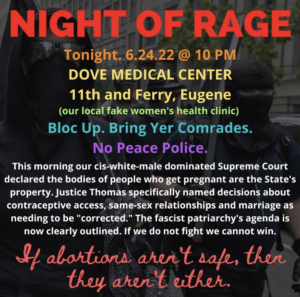Protests and Action in Response to Abortion Ruling
The constitutional right to an abortion in the U.S. that was guaranteed under Roe v. Wade no longer exists.
On June 24, the U.S. Supreme Court issued its decision on Dobbs v. Jackson Women’s Health Organization and ended the right to choose in 13 states with “trigger bans,” which were designed to take effect as soon as Roe was overturned, within 30 days. Several other states are expected to either revive old bans or revive legislation that had been stopped by the courts.
Oregon is not one of those states — something that has been reiterated by everyone from Gov. Kate Brown to An Do, executive director of Planned Parenthood Advocates of Oregon. “Regardless of the Supreme Court’s decisions, abortion is still legal in Oregon,” Do said in a Friday Zoom shortly after the Supreme Court opinion was announced.
Advocates for the right to choose are responding to the Dobbs decision with not only words but with action. Seeding Justice announced a $1 million contribution from Oregon’s Reproductive Health Equity Fund, still others are calling to take action by voting in the November midterm elections and protesters are gathering at the federal courthouse and other locations to voice their disagreement with the devastating ruling.
“Though we knew this was coming, this is still a dark day for us here in the United States,” says Kim Marks of Eugene’s As You Like It — A Pleasure Shop, an eco-conscious, green, gender-inclusive sex toy shop. “We have a long road in front of us to make this right for ourselves and future generations.” Marks is a life-long community activist, who was preparing for the shop’s grand reopening when the abortion news came through. She adds, she is “sitting with heartbreak hope everybody is able to get the support they need.”
The Ashland As You Like It store closed Friday in protest of the ruling, Marks says. Some people from the Eugene store will be protesting and others will stay and be a safe space for folks, she says.
That support for people who need abortions outside of Oregon — places like neighboring Idaho that have one of the trigger laws taking effect in 30 days — is a concern for abortion providers and advocates. “Reproductive justice is inextricably intertwined with racial, gender and economic justice,” Do said.
Sandy Chung of the American Civil Liberties Union of Oregon, also on the Zoom, said, “This decision will allow extremists across the country to ban abortion and will force women and others who can become pregnant into a second class status by denying them control over their bodies and their futures.”
She continued, “This is how systemic racism and misogyny work,” and pointed out that the most harm will come to communities with the least access to financial and health resources, such as Black, Indigenous and People of Color, and those who are disabled, low income and rural.
Portland-based Planned Parenthood Columbia Willamette, has leased a space for a clinic in Ontario, Oregon, a short drive from Idaho.
According to a press release from Seeding Justice and the Northwest Abortion Access Fund, Oregon health centers could see a 234 percent increase in out-of-state patients from neighboring states and beyond. And it cites an analysis by The New York Times indicating “Eastern Oregonians could see an up to 35 percent reduction in abortion access when Idaho’s trigger law banning abortion goes into effect.”
The Oregon Legislature established the Reproductive Health Equity Fund in the 2022 session with a $15 million state allocation. Administered by Seeding Justice, the Reproductive Health Equity Fund is to counter attacks on abortions access by providing resources for those who may be impacted by the loss of federal abortion protections the money.
The $1 million announced today was given to Northwest Abortion Access Fund to “strengthen its existing work with communities on the ground, providing resources and support to people seeking abortion, including the cost of procedures, helping getting to and from the clinic, a safe place to stay for those traveling for care, and more,” according to the release.
Also on Friday, Brown together with the governors of Washington and California announced a multi-state commitment to defend access to reproductive health care, including abortion and contraceptives, and committed to protecting patients and doctors against efforts by other states to enforce their abortion bans in our states
At a congressional level, Oregon. Sen. Ron Wyden issued a statement condemning the decision and calling for action at the ballot box: “The ultimate recourse for the American people is to expand majorities in the House and Senate that will do whatever it takes to codify Roe into law and expand access to safe, legal abortion nationwide,” he said.
Planned Parenthood Advocates of Oregon swiftly announced a rally at 5:30 pm, Friday June 24, the day the opinion was released, at the Wayne Morse Federal Courthouse. Masks and social distancing is encouraged, according to the We Won’t Go Back website.
And a “Night of Rage” has been announced as taking place at 10 pm at the Dove Medical clinic in Eugene. Dove is an anti-abortion medical center that calls itself a “free pregnancy diagnosis clinic” and claims to do “decision coaching.” An online flyer for the protest says calls Dove a “local fake women’s health clinic” and proclaims “If abortions aren’t safe, then they aren’t either.” Dove was boarded up earlier in the day.
The Planned Parenthood rally is 5:30 pm Friday June 24, at the Wayne Morse Federal Courthouse, 405 E. 8th Avenue.
As You Like It is located at 1655 W. 11th Avenue and its grand opening is noon to 6 pm June 26.
For information on where to get an abortion go to AbortionFinder.org.
For information on getting a vasectomy go to Planned Parenthood.
Eugene Weekly didn’t quote anti-choice advocates. That was on purpose.
